
chatwiki
开箱即用的基于企业私有知识库的LLM大语言模型的智能客服机器人问答系统,支持私有化部署,代码免费开源且可商用,由芝麻小客服官方推出。
Stars: 415
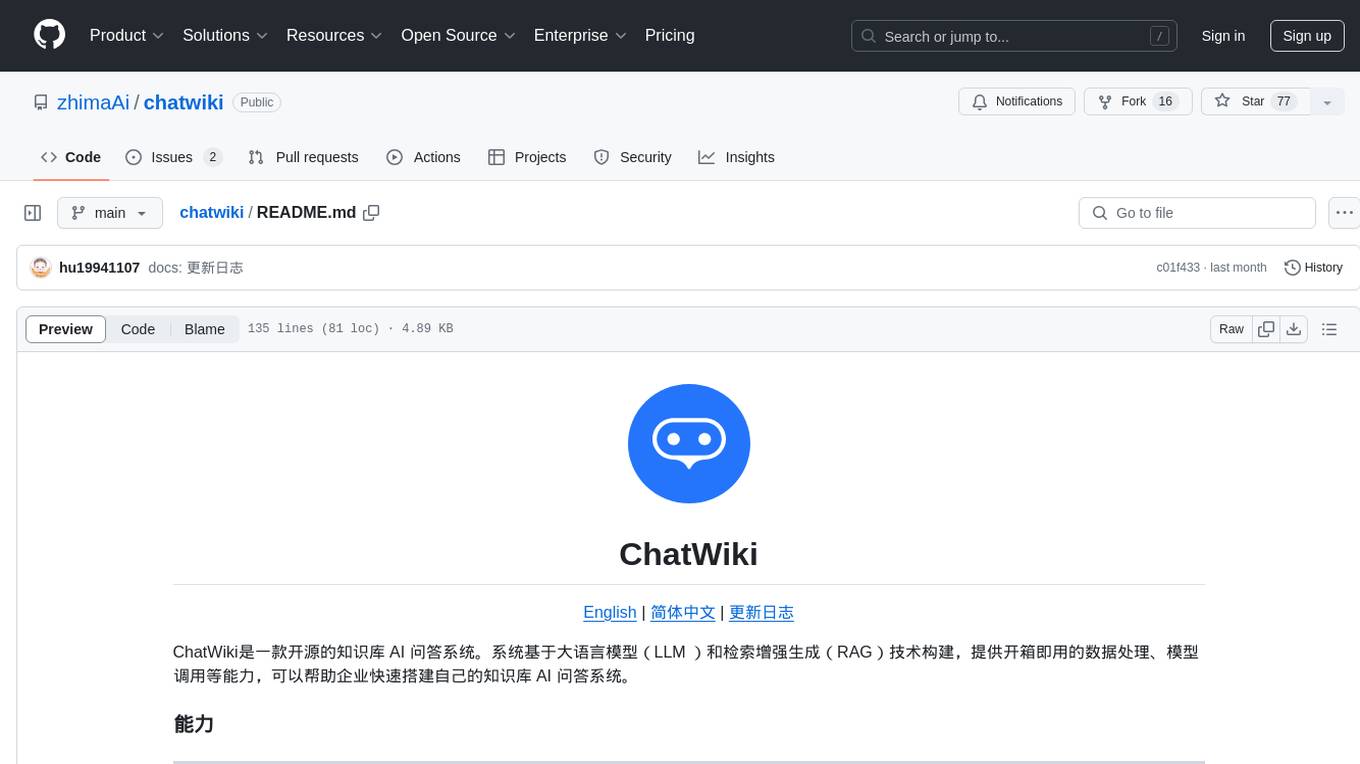
ChatWiki is an open-source knowledge base AI question-answering system. It is built on large language models (LLM) and retrieval-augmented generation (RAG) technologies, providing out-of-the-box data processing, model invocation capabilities, and helping enterprises quickly build their own knowledge base AI question-answering systems. It offers exclusive AI question-answering system, easy integration of models, data preprocessing, simple user interface design, and adaptability to different business scenarios.
README:
ChatWiki是一款开源的知识库 AI 问答系统。系统基于大语言模型(LLM )和检索增强生成(RAG)技术构建,提供开箱即用的数据处理、模型调用等能力,可以帮助企业快速搭建自己的知识库AI 问答系统。
-
🚀推荐先使用chatwiki云版本,快速构建验证思路与模式,之后再考虑独立部署,减少试错成本。👉️👉️chatwiki.com
-
🚀也可以通过官方demo体验对话效果👉️👉️体验ChatWiki WebApp👉️👉️体验ChatWiki 客户端
-
🚀点击下方图片,查看chatwiki演示视频
简单易用的企业专属AI问答智能体
通过导入企业已有知识构建知识库,让 AI 机器人使用关联的知识库回答问题,快速构建企业专属 AI 问答系统。支持DeepSeek R1、doubao pro、qwen max、Openai、Claude 等全球20多种主流模型。
灵活的工作流配置
提供灵活的工作流配置功能,支持多步骤任务编排与自动化处理。用户可根据业务需求自定义问答流程、数据流转,实现复杂场景下的智能化协作与管理。通过工作流,可以实现聊天机器人与业务系统的互通。
提供了多样化的调用渠道
支持 嵌入网站、桌面客户端、WebApp、微信小程序、微信公众号、微信客服、抖音企业号、快手号、视频号 及API调用等,全面覆盖企业多终端业务场景需求。
1、文档图片智能提取与回复
支持从上传的PDF、Word等知识库文档中自动提取内嵌图片,问答过程中当关联到含图片的文档内容时,机器人将同步返回文本与图片信息,实现精准的图文关联回复。
2、对外知识库门户一键生成
内置企业级帮助中心构建能力,支持将知识库内容快速发布为可公开访问的文档站点,提供SEO优化、多访问统计等功能,轻松打造品牌化客户支持门户。
3、智能上下文问题优化
ChatWiki可实时分析用户提问上下文,自动补全模糊或不完整的用户问题。通过意图识别与语义联想,将原始问题转化为精准检索指令,显著提升知识库检索命中率与回答相关性。
4、智能问题引导与常见问题
基于语义分析自动生成**「猜你想问」**推荐列表,也支持手动维护高频常见问题,结合用户历史交互动态优化推荐逻辑,有效提升问题命中率与用户体验。
5、精细化权限管理体系
提供企业级多级权限控制,支持角色分配(管理员/编辑员/只读成员),满足敏感数据管控与团队协作需求。
6、支持几乎所有主流模型
ChatWiki已支持全球20多种主流模型,只需要简单配置模型API key等信息即可成功接入模型。
7、数据自动预处理
提供自动分段、QA分段、手动输入和 CSV 等多种方式导入数据,ChatWiki自动对导入的文本数据进行预处理、向量化或 QA 分割。
8、简单易用的使用方式
ChatWiki采用直观的可视化界面设计,通过简洁易懂的操作步骤,可以轻松完成 AI 问答机器人和知识库的创建。
9、本地化数据存储与安全保障
ChatWiki支持企业使用本地数据库进行数据存储,确保数据完全自主掌控。通过多层安全防护机制(包括数据加密传输、访问权限控制、审计日志等),保障企业敏感信息的安全性,严格遵循数据隐私保护法规,为企业提供安全可靠的知识管理环境。
准备工作
在安装ChatWiki之前,您需要准备一台具有联网功能的linux服务器,并确保服务器满足最低系统要求
- Cpu:最低需要4 Core
- RAM:最低需要16 GB
开始安装
ChatWiki社区版基于Docker部署,请先确保服务器已经安装好Docker。如果没有安装,可以通过以下命令安装:
sudo curl -sSL https://get.docker.com/ | CHANNEL=stable sh
安装好Docker后,逐步执行一下步骤安装ChatWiki社区版
(1).克隆或下载chatwiki项目代码
//从github 克隆代码
git clone https://github.com/zhimaAi/chatwiki.git
//从gitee克隆代码
git clone [email protected]:zhimaAi/chatwiki.git(2).使用Docker Compose构建并启动项目
cd chatwiki/docker
docker compose up -d部署手册
在安装和部署中有任何问题或者建议,可以联系我们获取帮助,也可以参考下面的文档。
-
前端:vue.js
-
后端:golang +python
-
数据库:PostgreSQL16+pgvector+zhparser
-
缓存:redis5.0
-
web服务:nginx
-
异步队列:nsq
-
进程管理:supervisor
-
模型:支持OpenAI、Google Gemini、Claude3、通义千文、文心一言、讯飞星火、百川、腾讯混元等模型。
欢迎联系我们获取帮助,或者提供建议帮助我们改善ChatWiki。您可以通过以下方式联系我们:
-
微信: 使用微信扫码加入ChatWiki技术交流群

-
邮箱: 您可以发送邮件到[email protected]联系我们。
本仓库遵循ChatWiki Open Source License 开源协议。ChatWiki Open Source License基于Apache License 2.0协议,但是有一些额外的限制,包括:
1、允许作为后台服务商用,但是不可用于多租户SAAS模式。
2、除非您获取特定的商业许可,否则任何形式的商用服务均不可移除ChatWiki页面上的版权信息和ChatWiki logo。
完整协议请查看ChatWiki Open Source License ,需要获取额外的商业许可请联系我们
For Tasks:
Click tags to check more tools for each tasksFor Jobs:
Alternative AI tools for chatwiki
Similar Open Source Tools

chatwiki
ChatWiki is an open-source knowledge base AI question-answering system. It is built on large language models (LLM) and retrieval-augmented generation (RAG) technologies, providing out-of-the-box data processing, model invocation capabilities, and helping enterprises quickly build their own knowledge base AI question-answering systems. It offers exclusive AI question-answering system, easy integration of models, data preprocessing, simple user interface design, and adaptability to different business scenarios.
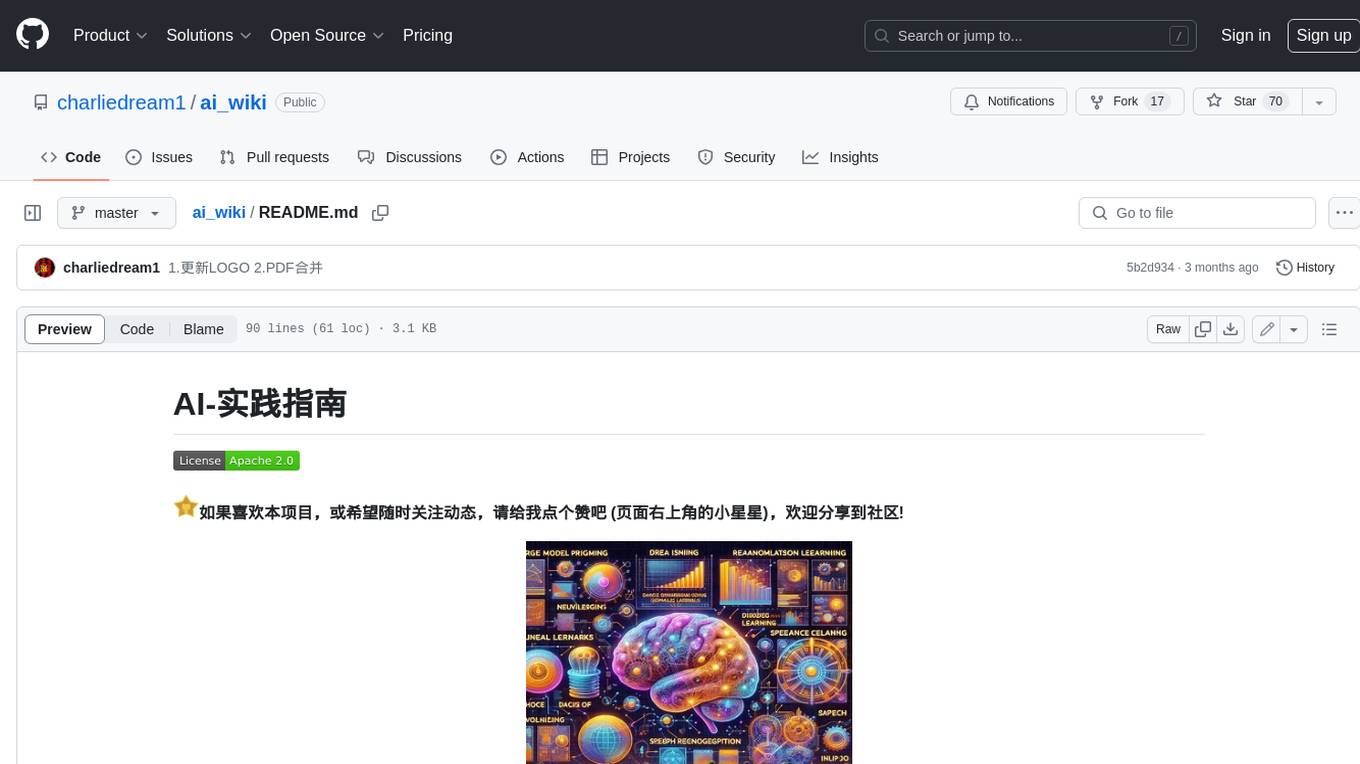
ai_wiki
This repository provides a comprehensive collection of resources, open-source tools, and knowledge related to quantitative analysis. It serves as a valuable knowledge base and navigation guide for individuals interested in various aspects of quantitative investing, including platforms, programming languages, mathematical foundations, machine learning, deep learning, and practical applications. The repository is well-structured and organized, with clear sections covering different topics. It includes resources on system platforms, programming codes, mathematical foundations, algorithm principles, machine learning, deep learning, reinforcement learning, graph networks, model deployment, and practical applications. Additionally, there are dedicated sections on quantitative trading and investment, as well as large models. The repository is actively maintained and updated, ensuring that users have access to the latest information and resources.
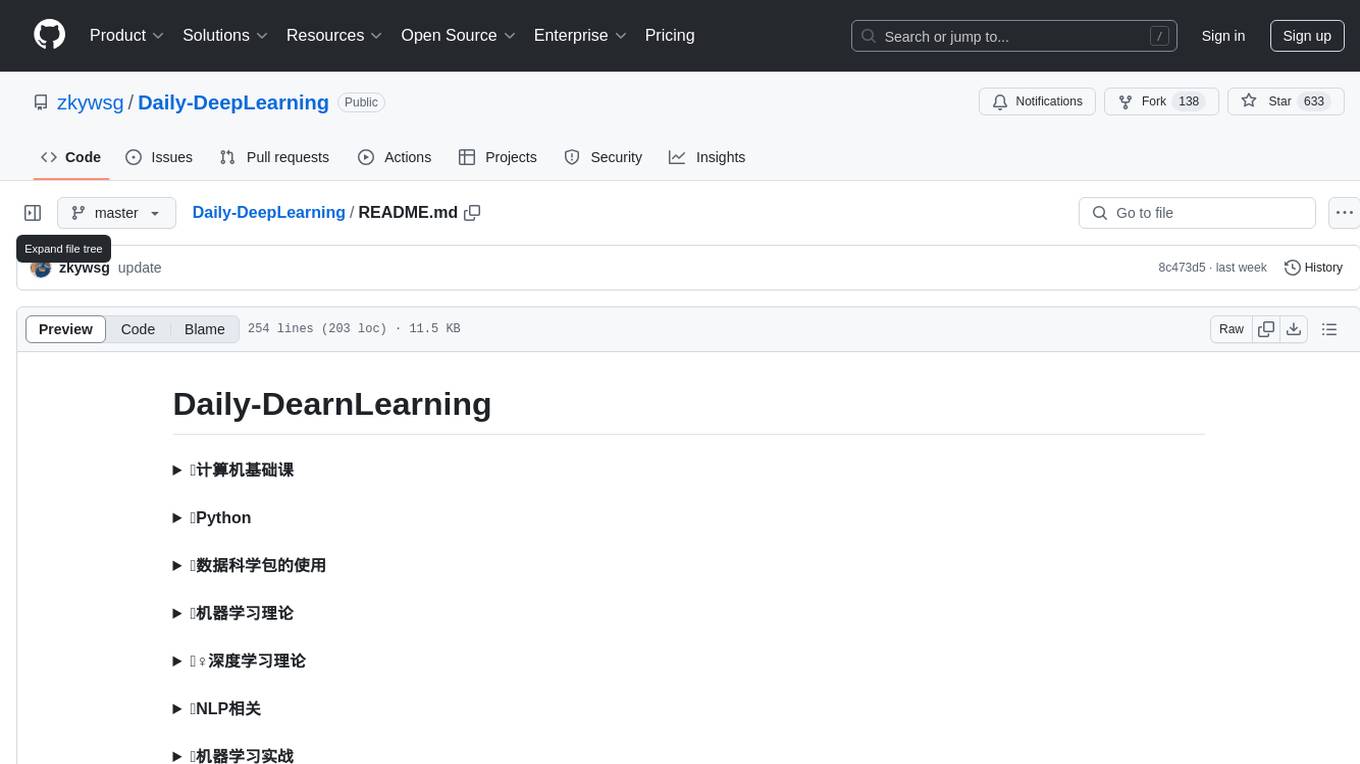
Daily-DeepLearning
Daily-DeepLearning is a repository that covers various computer science topics such as data structures, operating systems, computer networks, Python programming, data science packages like numpy, pandas, matplotlib, machine learning theories, deep learning theories, NLP concepts, machine learning practical applications, deep learning practical applications, and big data technologies like Hadoop and Hive. It also includes coding exercises related to '剑指offer'. The repository provides detailed explanations and examples for each topic, making it a comprehensive resource for learning and practicing different aspects of computer science and data-related fields.
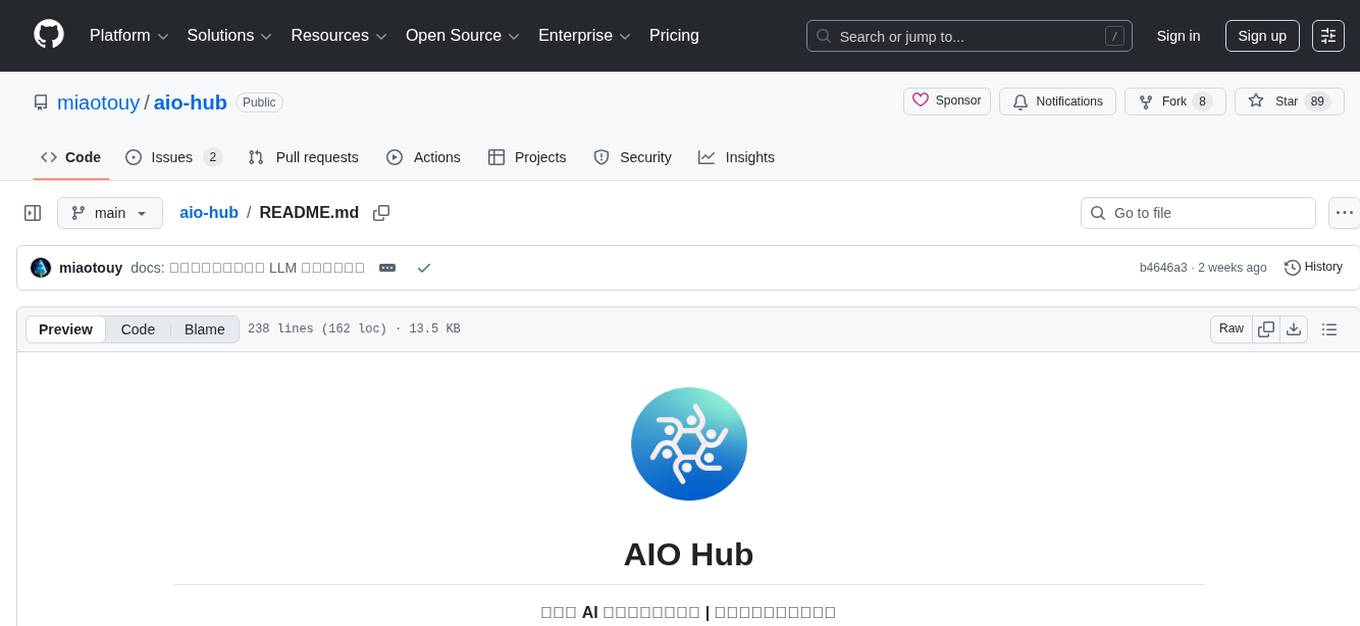
aio-hub
AIO Hub is a cross-platform AI hub built on Tauri + Vue 3 + TypeScript, aiming to provide developers and creators with precise LLM control experience and efficient toolchain. It features a chat function designed for complex tasks and deep exploration, a unified context pipeline for controlling every token sent to the model, interactive AI buttons, dual-view management for non-linear conversation mapping, open ecosystem compatibility with various AI models, and a rich text renderer for LLM output. The tool also includes features for media workstation, developer productivity, system and asset management, regex applier, collaboration enhancement between developers and AI, and more.
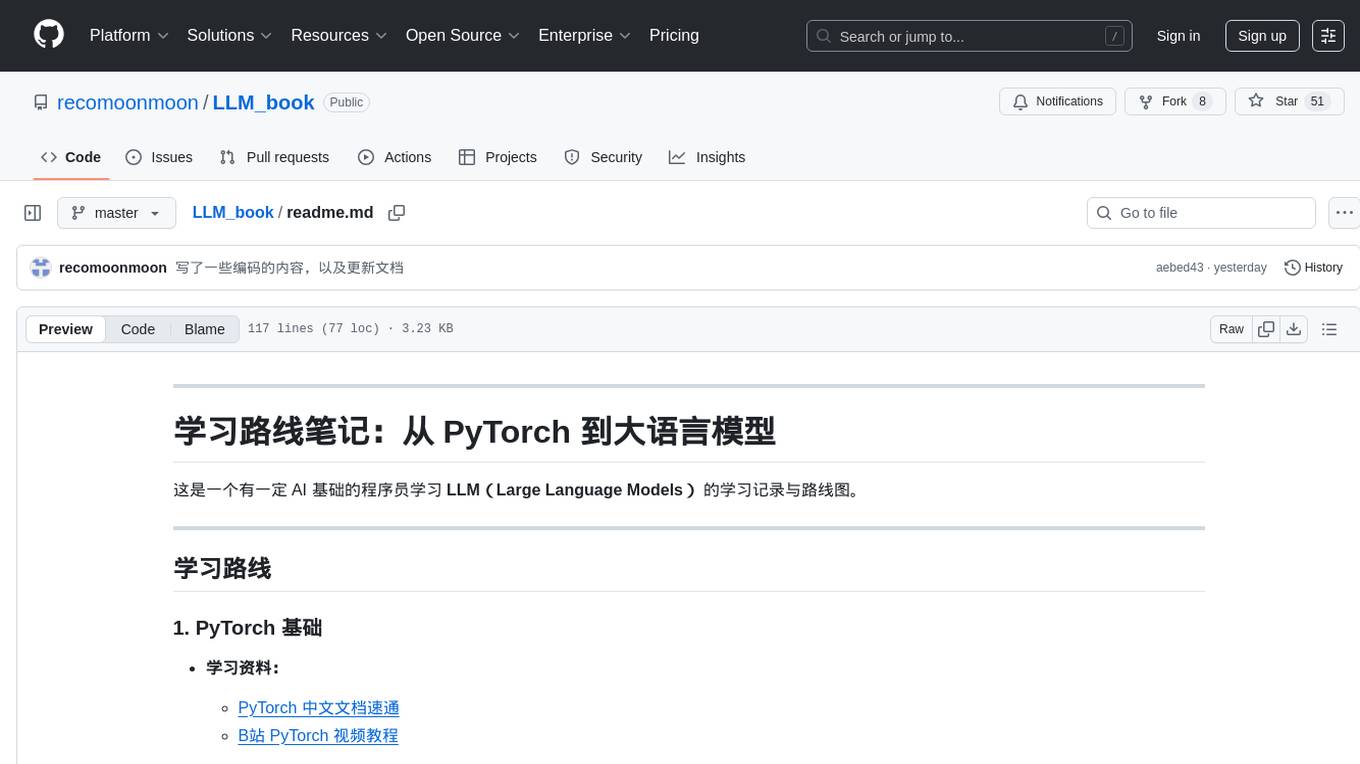
LLM_book
LLM_book is a learning record and roadmap for programmers with a certain AI foundation to learn Large Language Models (LLM). It covers topics such as PyTorch basics, Transformer architecture, langchain basics, foundational concepts of large models, fine-tuning methods, RAG (Retrieval-Augmented Generation), and building intelligent agents using LLM. The repository provides learning materials, code implementations, and documentation to help users progress in understanding and implementing LLM technologies.
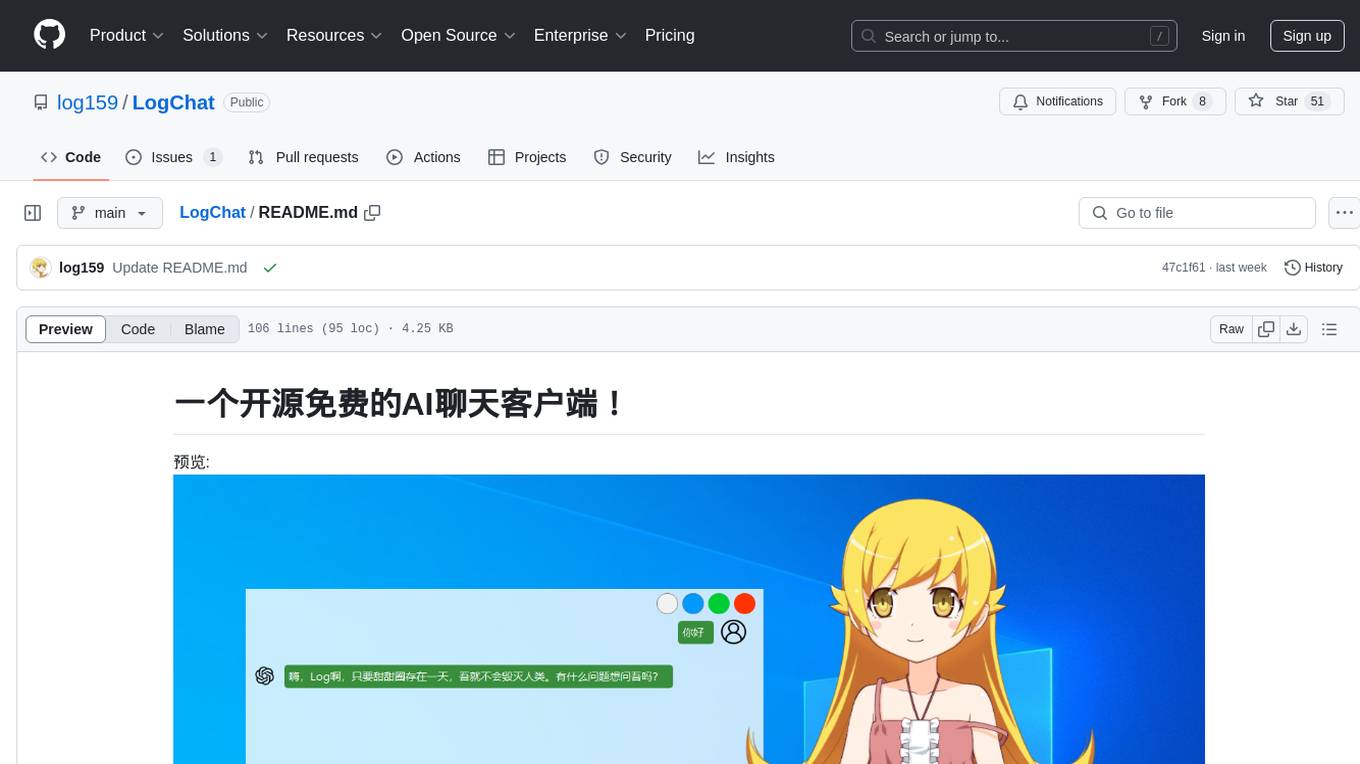
LogChat
LogChat is an open-source and free AI chat client that supports various chat models and technologies such as ChatGPT, 讯飞星火, DeepSeek, LLM, TTS, STT, and Live2D. The tool provides a user-friendly interface designed using Qt Creator and can be used on Windows systems without any additional environment requirements. Users can interact with different AI models, perform voice synthesis and recognition, and customize Live2D character models. LogChat also offers features like language translation, AI platform integration, and menu items like screenshot editing, clock, and application launcher.
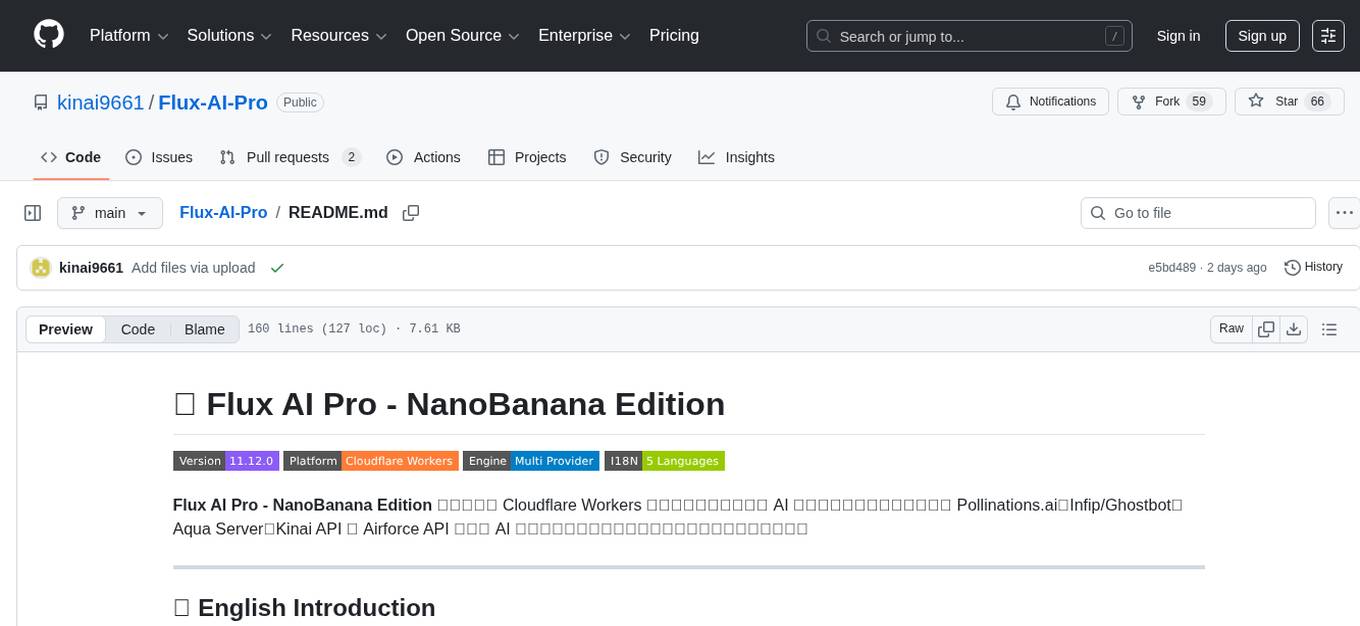
Flux-AI-Pro
Flux AI Pro - NanoBanana Edition is a high-performance, single-file AI image generation solution built on Cloudflare Workers. It integrates top AI providers like Pollinations.ai, Infip/Ghostbot, Aqua Server, Kinai API, and Airforce API to offer a serverless, fast, and feature-rich creative experience. It provides seamless interface for generating high-quality AI art without complex server setups. The tool supports multiple languages, smart language detection, RTL support, AI prompt generator, high-definition image generation, and local history storage with export/import functionality.
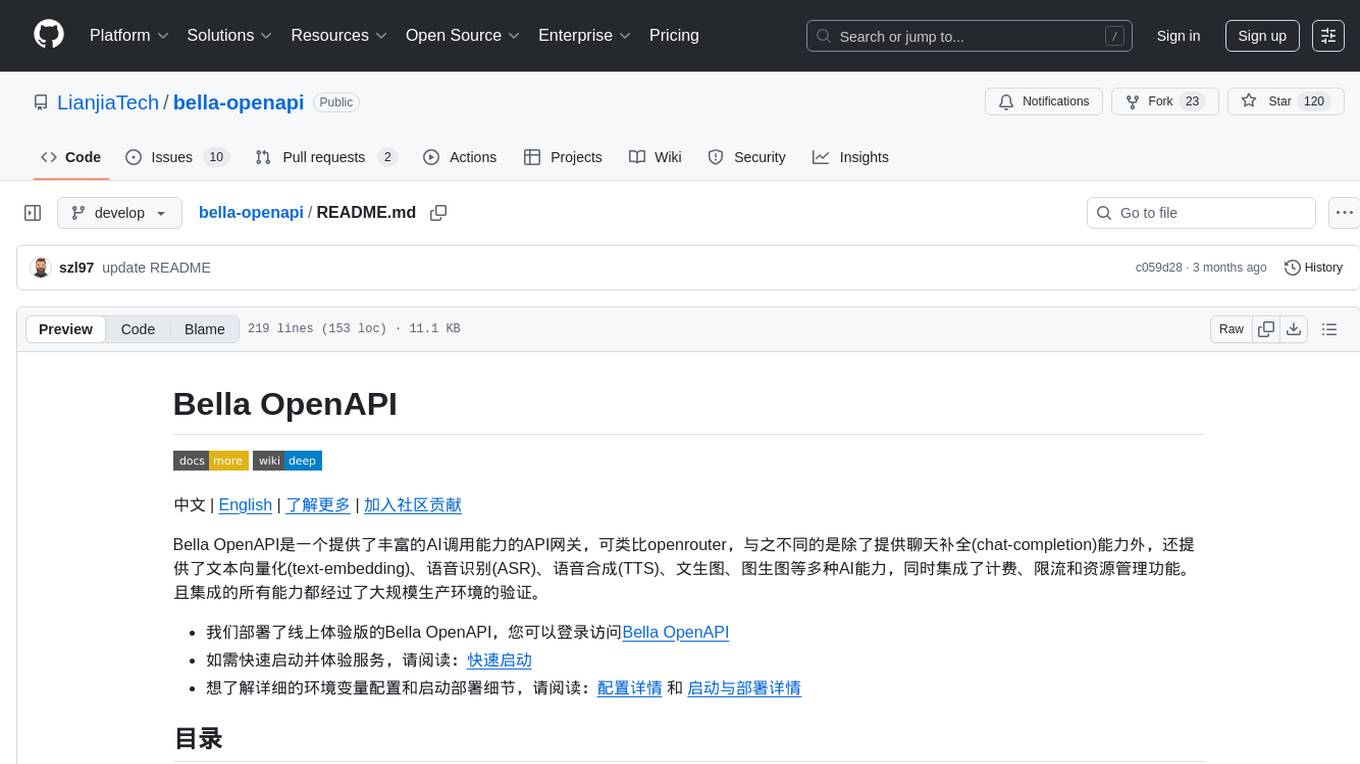
bella-openapi
Bella OpenAPI is an API gateway that provides rich AI capabilities, similar to openrouter. In addition to chat completion ability, it also offers text embedding, ASR, TTS, image-to-image, and text-to-image AI capabilities. It integrates billing, rate limiting, and resource management functions. All integrated capabilities have been validated in large-scale production environments. The tool supports various AI capabilities, metadata management, unified login service, billing and rate limiting, and has been validated in large-scale production environments for stability and reliability. It offers a user-friendly experience with Java-friendly technology stack, convenient cloud-based experience service, and Dockerized deployment.
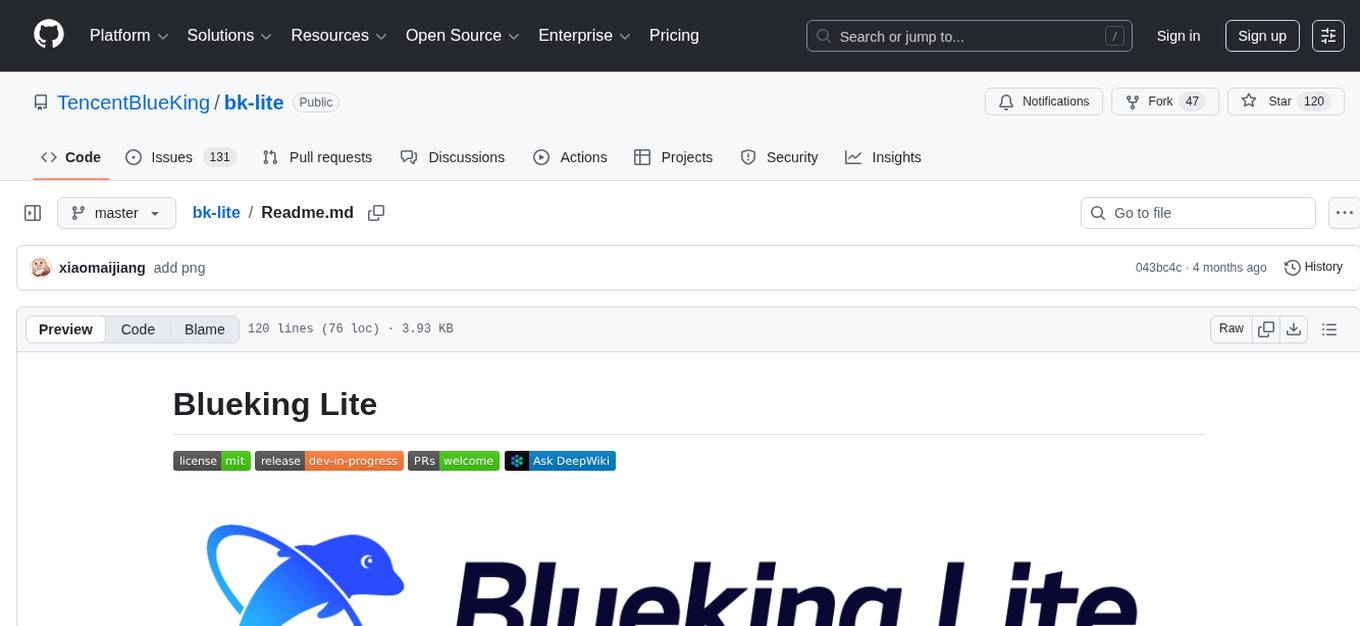
bk-lite
Blueking Lite is an AI First lightweight operation product with low deployment resource requirements, low usage costs, and progressive experience, providing essential tools for operation administrators.
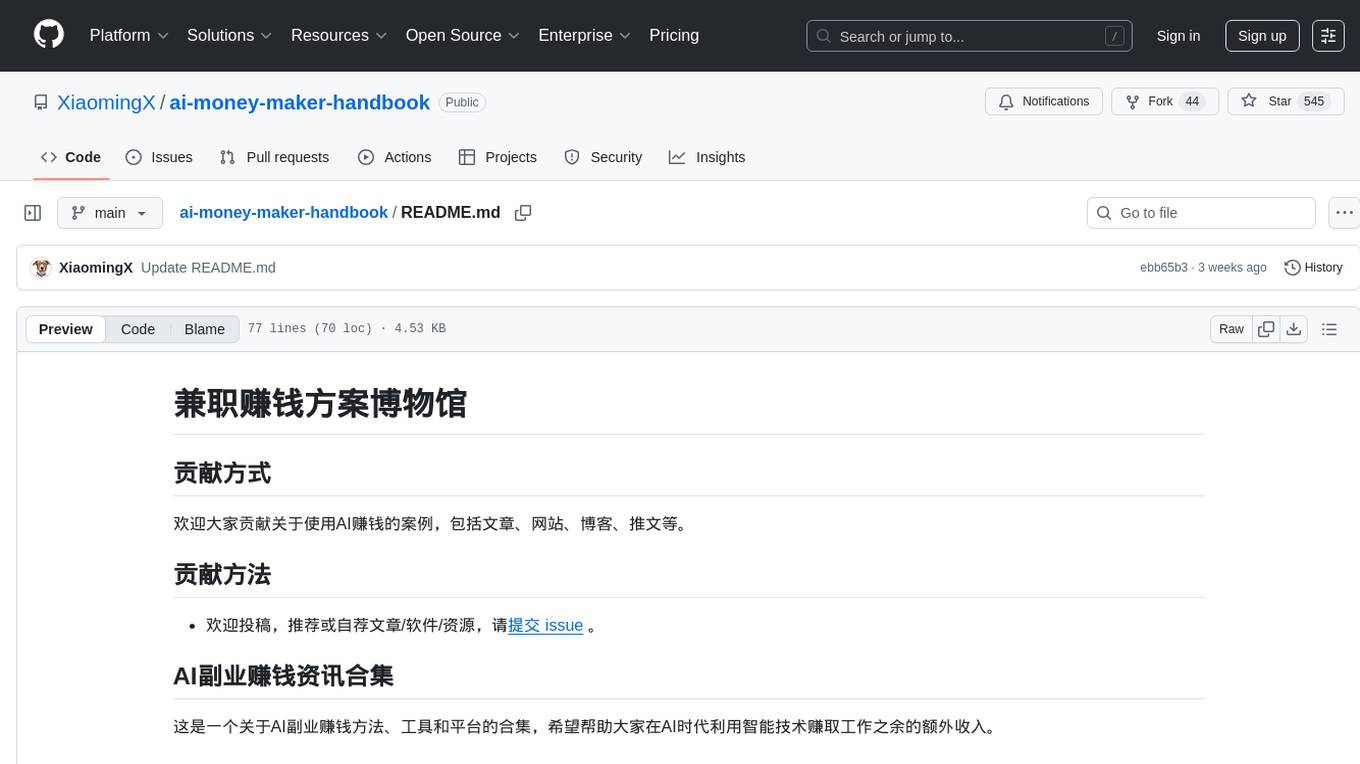
ai-money-maker-handbook
The 'ai-money-maker-handbook' repository is a collection of information on using AI to earn extra income through side jobs. It includes strategies, resources, and verified methods for making money with AI technology in various fields. The repository provides insights on leveraging AI tools, platforms, and techniques to generate additional revenue streams in the AI era.
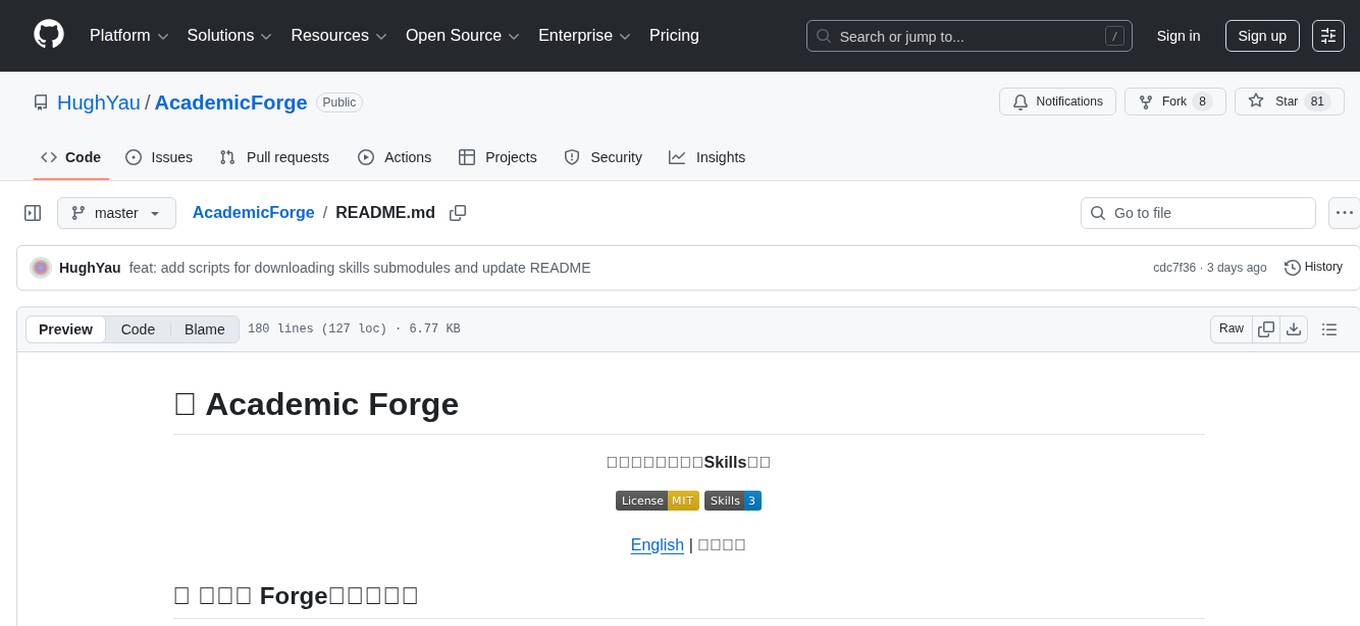
AcademicForge
Academic Forge is a collection of skills integrated for academic writing workflows. It provides a curated set of skills related to academic writing and research, allowing for precise skill calls, avoiding confusion between similar skills, maintaining focus on research workflows, and receiving timely updates from original authors. The forge integrates carefully selected skills covering various areas such as bioinformatics, clinical research, data analysis, scientific writing, laboratory automation, machine learning, databases, AI research, model architectures, fine-tuning, post-training, distributed training, optimization, inference, evaluation, agents, multimodal tasks, and machine learning paper writing. It is designed to streamline the academic writing and AI research processes by providing a cohesive and community-driven collection of skills.
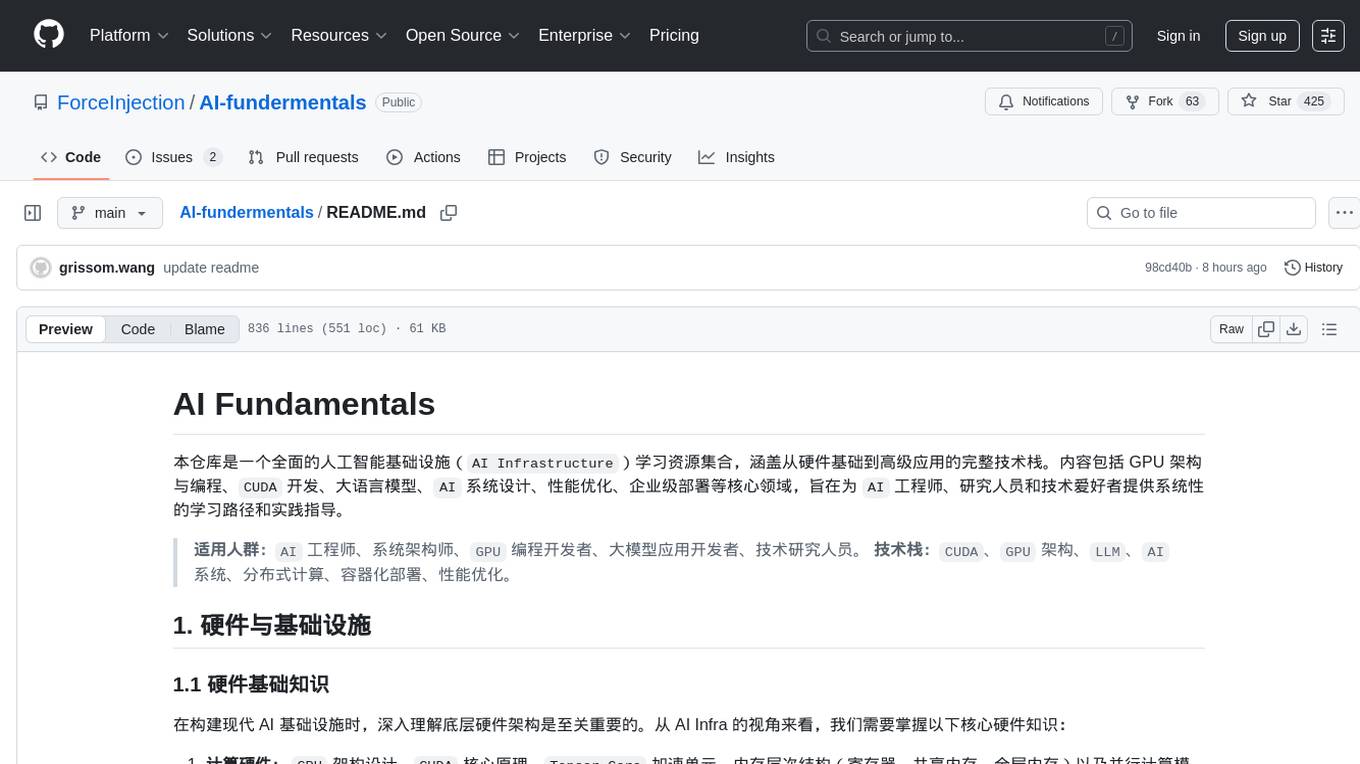
AI-fundermentals
AI Fundamentals is a comprehensive AI infrastructure learning resource collection, covering a complete technical stack from hardware basics to advanced applications. It includes GPU architecture and programming, CUDA development, large language models, AI system design, performance optimization, enterprise deployment, and more. The repository aims to provide a systematic learning path and practical guidance for AI engineers, architects, GPU programming developers, large model application developers, and technical researchers.
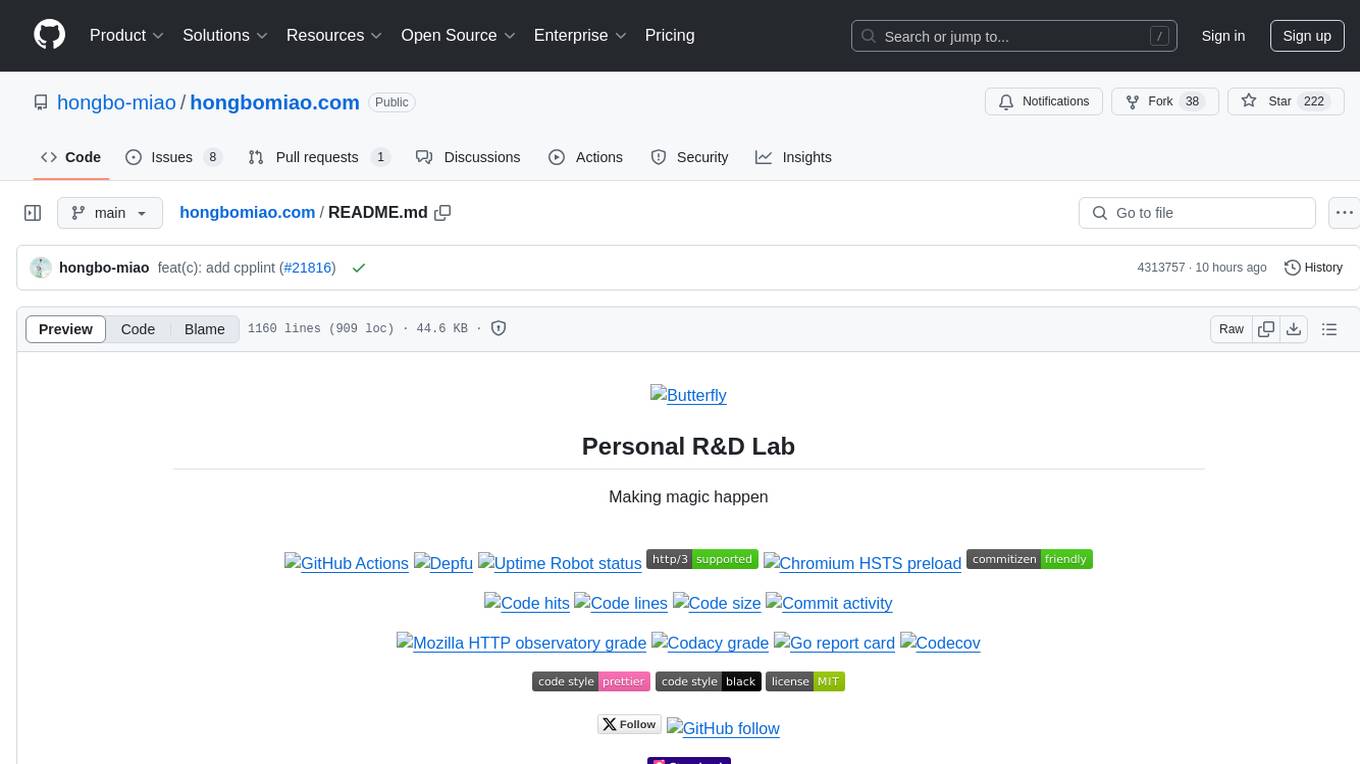
hongbomiao.com
hongbomiao.com is a personal research and development (R&D) lab that facilitates the sharing of knowledge. The repository covers a wide range of topics including web development, mobile development, desktop applications, API servers, cloud native technologies, data processing, machine learning, computer vision, embedded systems, simulation, database management, data cleaning, data orchestration, testing, ops, authentication, authorization, security, system tools, reverse engineering, Ethereum, hardware, network, guidelines, design, bots, and more. It provides detailed information on various tools, frameworks, libraries, and platforms used in these domains.

LabelQuick
LabelQuick_V2.0 is a fast image annotation tool designed and developed by the AI Horizon team. This version has been optimized and improved based on the previous version. It provides an intuitive interface and powerful annotation and segmentation functions to efficiently complete dataset annotation work. The tool supports video object tracking annotation, quick annotation by clicking, and various video operations. It introduces the SAM2 model for accurate and efficient object detection in video frames, reducing manual intervention and improving annotation quality. The tool is designed for Windows systems and requires a minimum of 6GB of memory.
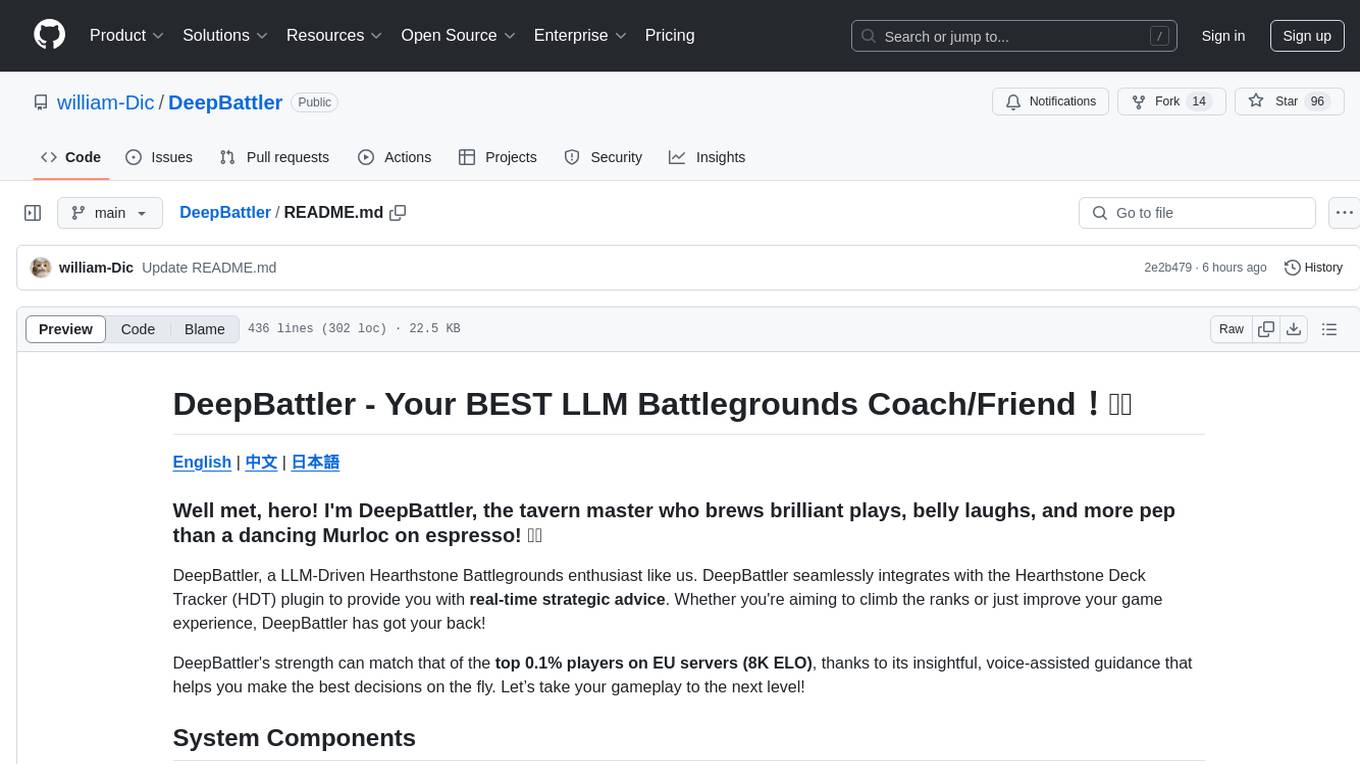
DeepBattler
DeepBattler is a tool designed for Hearthstone Battlegrounds players, providing real-time strategic advice and insights to improve gameplay experience. It integrates with the Hearthstone Deck Tracker plugin and offers voice-assisted guidance. The tool is powered by a large language model (LLM) and can match the strength of top players on EU servers. Users can set up the tool by adding dependencies, configuring the plugin path, and launching the LLM agent. DeepBattler is licensed for personal, educational, and non-commercial use, with guidelines on non-commercial distribution and acknowledgment of external contributions.
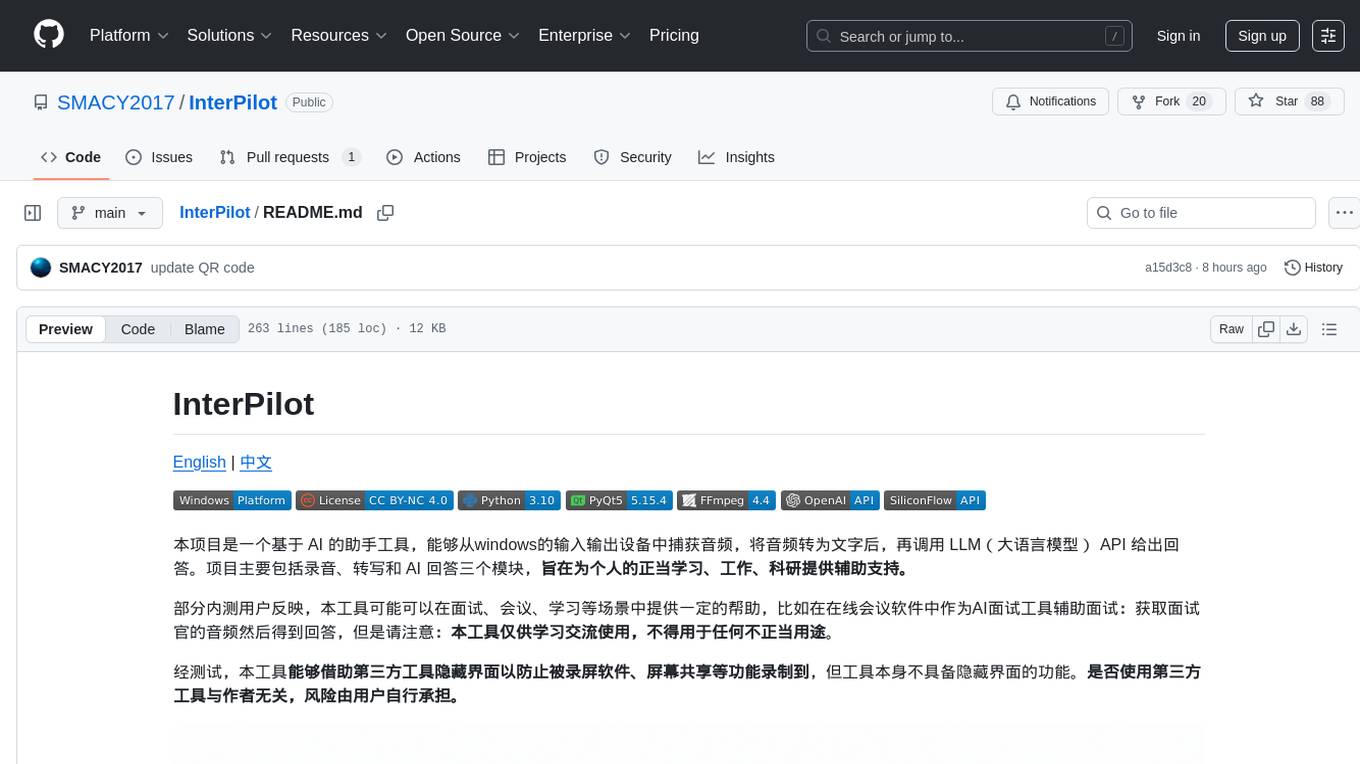
InterPilot
InterPilot is an AI-based assistant tool that captures audio from Windows input/output devices, transcribes it into text, and then calls the Large Language Model (LLM) API to provide answers. The project includes recording, transcription, and AI response modules, aiming to provide support for personal legitimate learning, work, and research. It may assist in scenarios like interviews, meetings, and learning, but it is strictly for learning and communication purposes only. The tool can hide its interface using third-party tools to prevent screen recording or screen sharing, but it does not have this feature built-in. Users bear the risk of using third-party tools independently.
For similar tasks
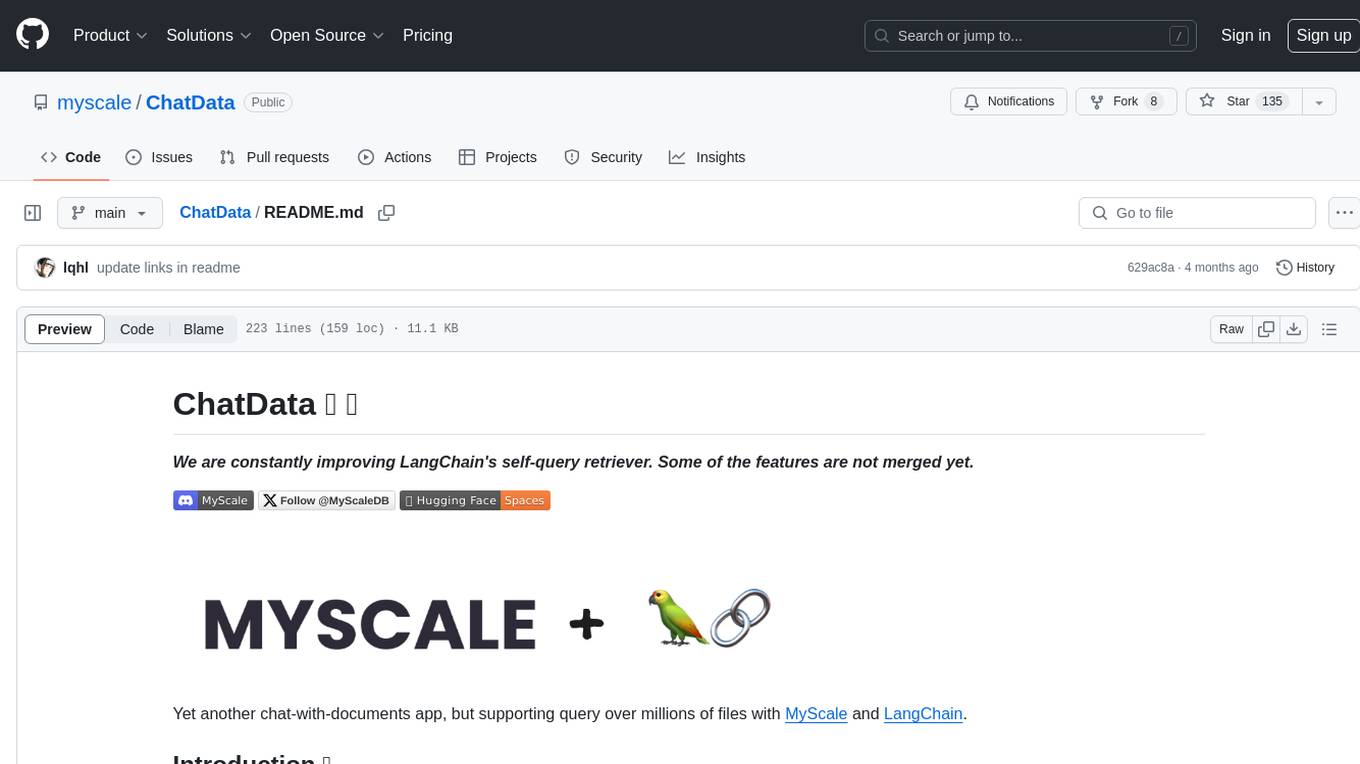
ChatData
ChatData is a robust chat-with-documents application designed to extract information and provide answers by querying the MyScale free knowledge base or uploaded documents. It leverages the Retrieval Augmented Generation (RAG) framework, millions of Wikipedia pages, and arXiv papers. Features include self-querying retriever, VectorSQL, session management, and building a personalized knowledge base. Users can effortlessly navigate vast data, explore academic papers, and research documents. ChatData empowers researchers, students, and knowledge enthusiasts to unlock the true potential of information retrieval.
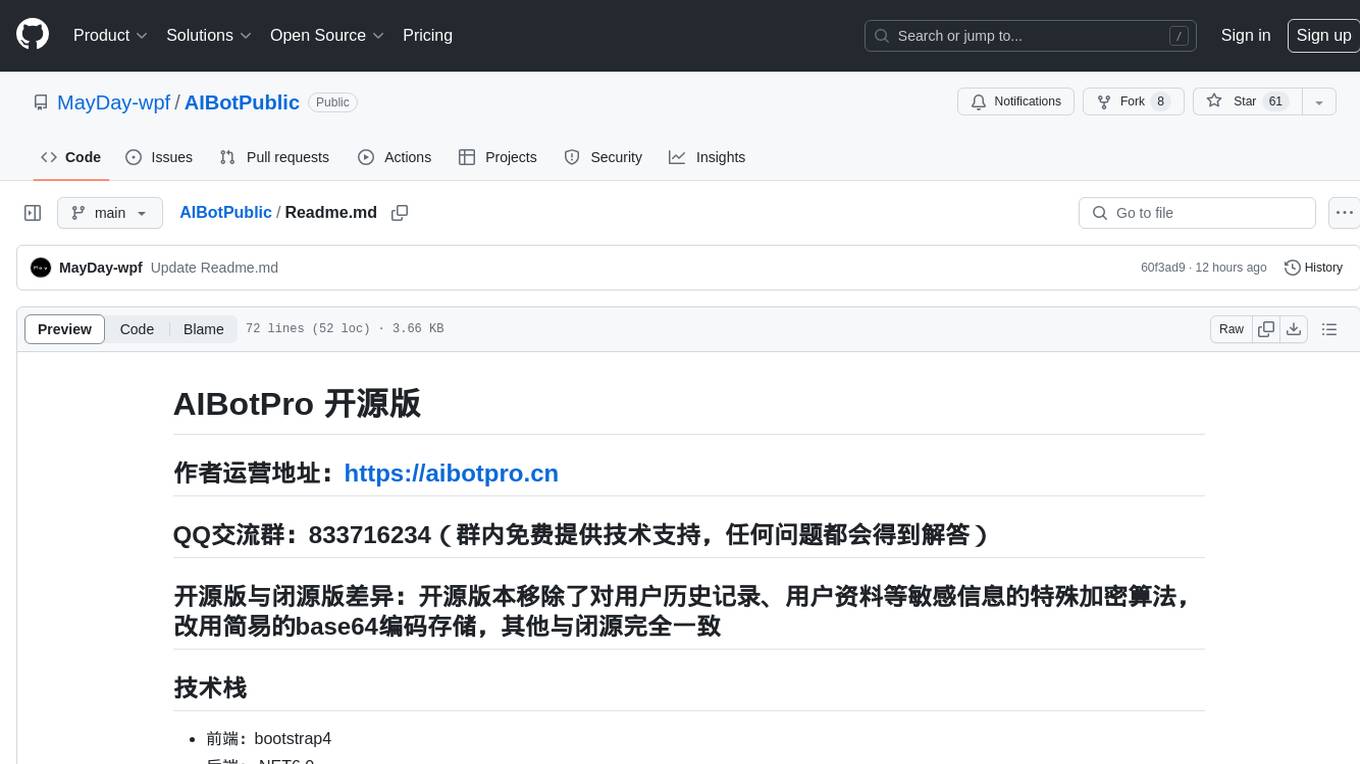
AIBotPublic
AIBotPublic is an open-source version of AIBotPro, a comprehensive AI tool that provides various features such as knowledge base construction, AI drawing, API hosting, and more. It supports custom plugins and parallel processing of multiple files. The tool is built using bootstrap4 for the frontend, .NET6.0 for the backend, and utilizes technologies like SqlServer, Redis, and Milvus for database and vector database functionalities. It integrates third-party dependencies like Baidu AI OCR, Milvus C# SDK, Google Search, and more to enhance its capabilities.

chatwiki
ChatWiki is an open-source knowledge base AI question-answering system. It is built on large language models (LLM) and retrieval-augmented generation (RAG) technologies, providing out-of-the-box data processing, model invocation capabilities, and helping enterprises quickly build their own knowledge base AI question-answering systems. It offers exclusive AI question-answering system, easy integration of models, data preprocessing, simple user interface design, and adaptability to different business scenarios.
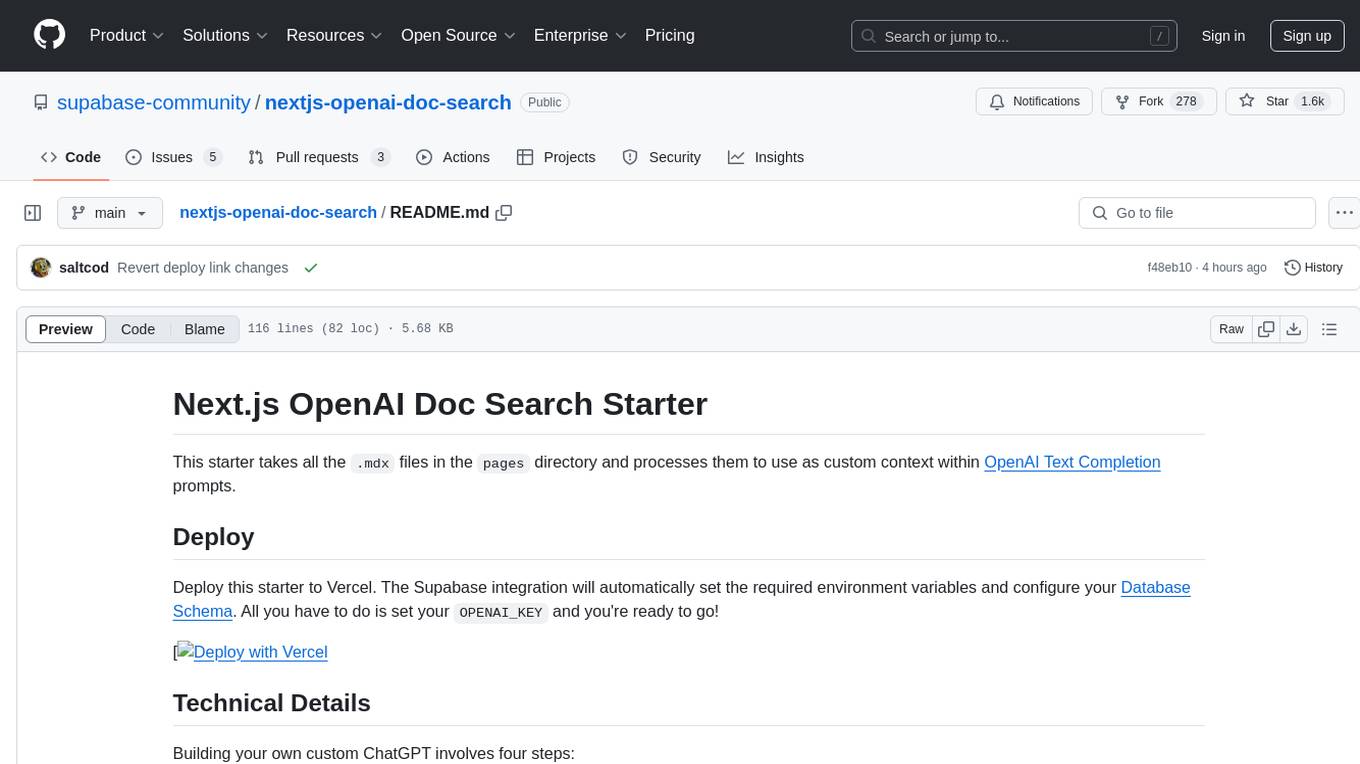
nextjs-openai-doc-search
This starter project is designed to process `.mdx` files in the `pages` directory to use as custom context within OpenAI Text Completion prompts. It involves building a custom ChatGPT style doc search powered by Next.js, OpenAI, and Supabase. The project includes steps for pre-processing knowledge base, storing embeddings in Postgres, performing vector similarity search, and injecting content into OpenAI GPT-3 text completion prompt.
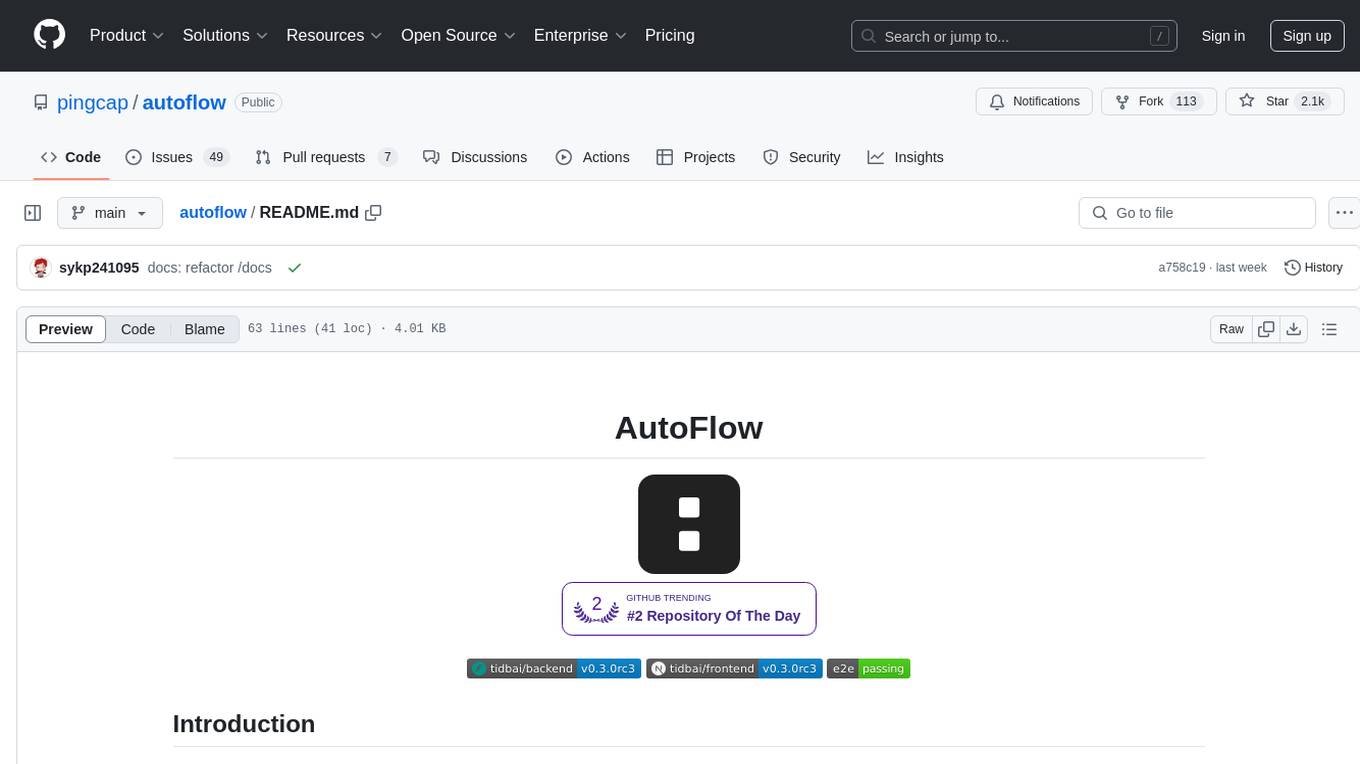
autoflow
AutoFlow is an open source graph rag based knowledge base tool built on top of TiDB Vector and LlamaIndex and DSPy. It features a Perplexity-style Conversational Search page and an Embeddable JavaScript Snippet for easy integration into websites. The tool allows for comprehensive coverage and streamlined search processes through sitemap URL scraping.
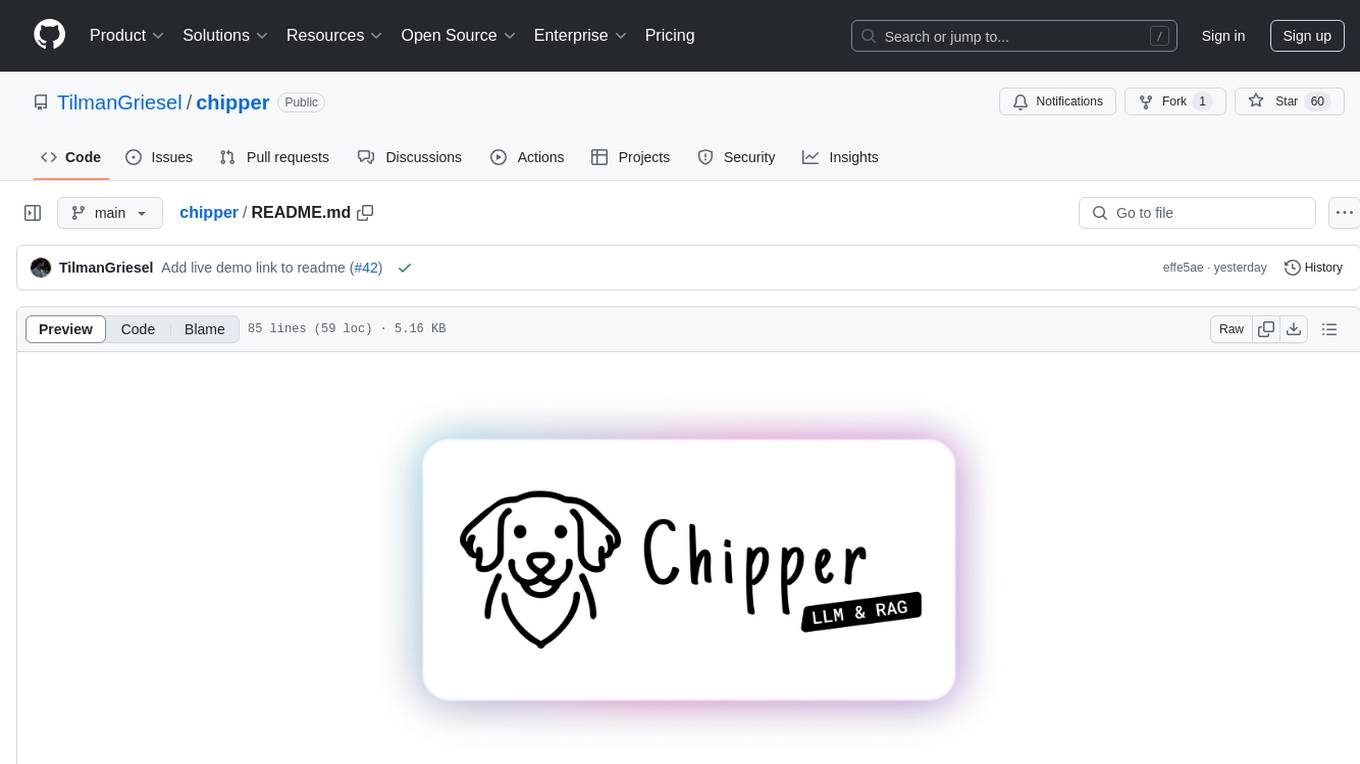
chipper
Chipper provides a web interface, CLI, and architecture for pipelines, document chunking, web scraping, and query workflows. It is built with Haystack, Ollama, Hugging Face, Docker, Tailwind, and ElasticSearch, running locally or as a Dockerized service. Originally created to assist in creative writing, it now offers features like local Ollama and Hugging Face API, ElasticSearch embeddings, document splitting, web scraping, audio transcription, user-friendly CLI, and Docker deployment. The project aims to be educational, beginner-friendly, and a playground for AI exploration and innovation.
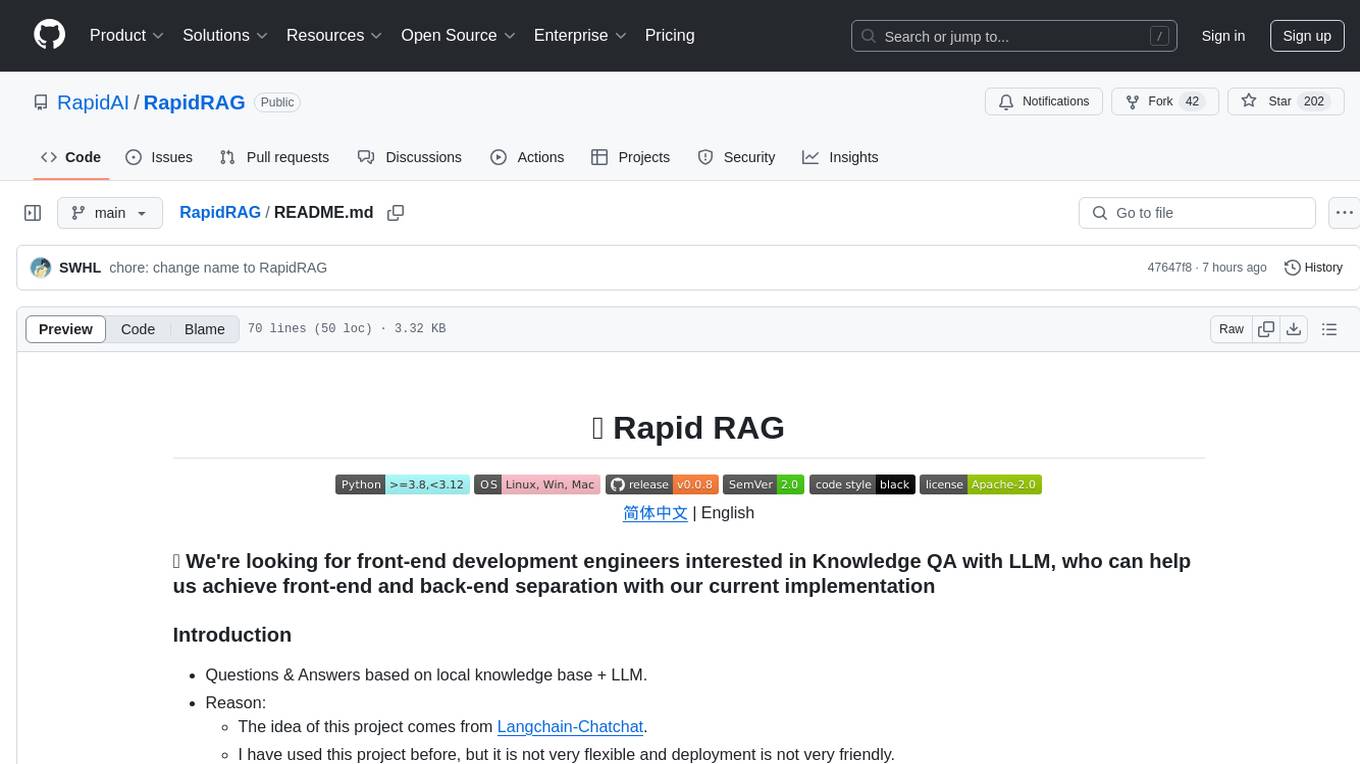
RapidRAG
RapidRAG is a project focused on Knowledge QA with LLM, combining Questions & Answers based on local knowledge base with a large language model. The project aims to provide a flexible and deployment-friendly solution for building a knowledge question answering system. It is modularized, allowing easy replacement of parts and simple code understanding. The tool supports various document formats and can utilize CPU for most parts, with the large language model interface requiring separate deployment.
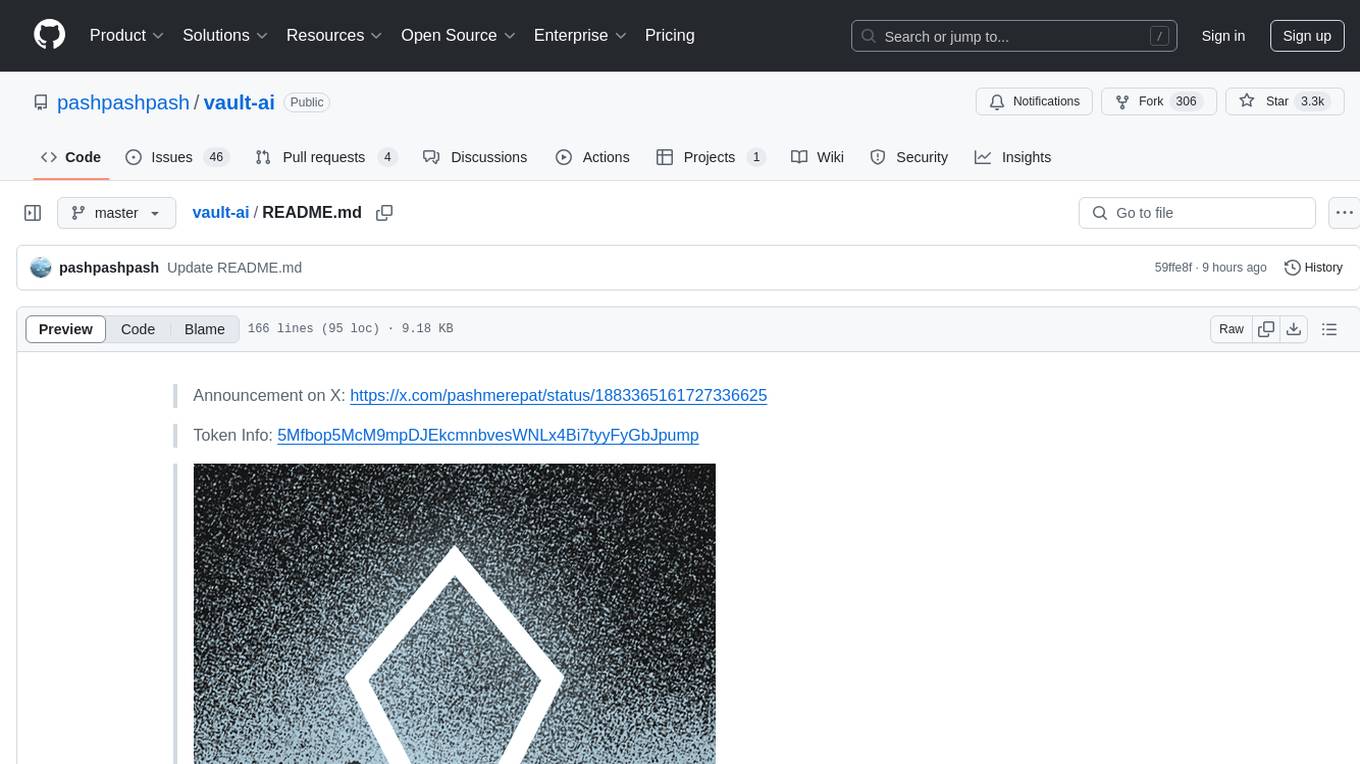
vault-ai
OP Vault is a tool that leverages the OP Stack (OpenAI + Pinecone Vector Database) to allow users to upload custom knowledgebase files and ask questions about their contents. It provides a user-friendly Golang server and React frontend for querying human-readable content like books and documents, making it valuable for knowledge extraction and question-answering. Users can upload entire libraries, receive specific answers with file and section references, and explore the power of the OP Stack in a practical interface.
For similar jobs

sweep
Sweep is an AI junior developer that turns bugs and feature requests into code changes. It automatically handles developer experience improvements like adding type hints and improving test coverage.

teams-ai
The Teams AI Library is a software development kit (SDK) that helps developers create bots that can interact with Teams and Microsoft 365 applications. It is built on top of the Bot Framework SDK and simplifies the process of developing bots that interact with Teams' artificial intelligence capabilities. The SDK is available for JavaScript/TypeScript, .NET, and Python.

ai-guide
This guide is dedicated to Large Language Models (LLMs) that you can run on your home computer. It assumes your PC is a lower-end, non-gaming setup.

classifai
Supercharge WordPress Content Workflows and Engagement with Artificial Intelligence. Tap into leading cloud-based services like OpenAI, Microsoft Azure AI, Google Gemini and IBM Watson to augment your WordPress-powered websites. Publish content faster while improving SEO performance and increasing audience engagement. ClassifAI integrates Artificial Intelligence and Machine Learning technologies to lighten your workload and eliminate tedious tasks, giving you more time to create original content that matters.

chatbot-ui
Chatbot UI is an open-source AI chat app that allows users to create and deploy their own AI chatbots. It is easy to use and can be customized to fit any need. Chatbot UI is perfect for businesses, developers, and anyone who wants to create a chatbot.

BricksLLM
BricksLLM is a cloud native AI gateway written in Go. Currently, it provides native support for OpenAI, Anthropic, Azure OpenAI and vLLM. BricksLLM aims to provide enterprise level infrastructure that can power any LLM production use cases. Here are some use cases for BricksLLM: * Set LLM usage limits for users on different pricing tiers * Track LLM usage on a per user and per organization basis * Block or redact requests containing PIIs * Improve LLM reliability with failovers, retries and caching * Distribute API keys with rate limits and cost limits for internal development/production use cases * Distribute API keys with rate limits and cost limits for students

uAgents
uAgents is a Python library developed by Fetch.ai that allows for the creation of autonomous AI agents. These agents can perform various tasks on a schedule or take action on various events. uAgents are easy to create and manage, and they are connected to a fast-growing network of other uAgents. They are also secure, with cryptographically secured messages and wallets.

griptape
Griptape is a modular Python framework for building AI-powered applications that securely connect to your enterprise data and APIs. It offers developers the ability to maintain control and flexibility at every step. Griptape's core components include Structures (Agents, Pipelines, and Workflows), Tasks, Tools, Memory (Conversation Memory, Task Memory, and Meta Memory), Drivers (Prompt and Embedding Drivers, Vector Store Drivers, Image Generation Drivers, Image Query Drivers, SQL Drivers, Web Scraper Drivers, and Conversation Memory Drivers), Engines (Query Engines, Extraction Engines, Summary Engines, Image Generation Engines, and Image Query Engines), and additional components (Rulesets, Loaders, Artifacts, Chunkers, and Tokenizers). Griptape enables developers to create AI-powered applications with ease and efficiency.













